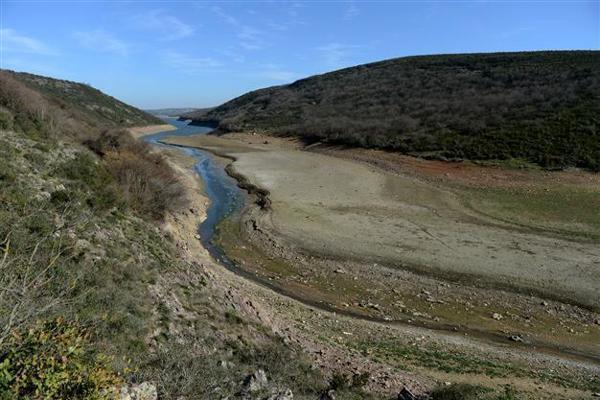Drought fuels fears over energy costs, food price rises
ISTANBUL/ANKARA


AA Photo
High temperatures and a lack of rain are fueling fears over agricultural production and energy prices, as Western and Central Anatolia experience one of the driest winters in recent years.Water levels in dams and humidity levels have dropped to alarming levels, with the temperature across Turkey hovering around 10 degrees Celsius above the average and rain and snowfall levels remaining far below seasonal averages.
The average rainfall in the October-January period was 222 millimeters, 27 percent below the seasonal norm, according to data from Meteorology General Directorate. The sharpest drops were recorded in the Mediterranean and Central Anatolian regions, where the average rainfall was 38 percent below average levels.
The persistence of the drought could slash fruit and vegetable production by a quarter and increase prices at least 20 percent, the head of the Turkish Agriculturists’ Association (TZD) has warned.
“We are passing through a critical threshold. There is no joke here,” TZD Chairman İbrahim Yetkin told daily Hürriyet yesterday.
Yetkin said he was collecting the latest information from every city in the country daily and described the current situation as “worrisome.”
He said the planting season for products like sugar beet, sunflowers, corn and soya had arrived, but the soil was not suitable for planting, as these products require humid soil and periodic rainfall. He added that potato growers would have to reap their harvest in April and if the soil did not get enough water by that time, efficiency targets would not be achieved.
In addition to the potential rout it would create in the domestic market, the dropping harvest and production would deal a major blow to exports, Yetkin also warned.
In order for an efficient harvest to be yielded and for further losses to be avoided, sector representatives say that total rainfall in March and April will be crucial.
Energy Minister Taner Yıldız has drawn attention to another aspect of the issue, saying the government could boost natural gas use in the summer to cover the gap that will emerge by the drop in electricity production by dams.
“The current decrease in the level of rainfall and snowfall across the country negatively affects water levels in the hydroelectric power plants and is likely to decrease electricity production in dams,” said Yıldız during a press conference in Ankara.
He said the use of natural gas for electricity production in the summer, which usually declines during the summer season, would increase in order to compensate the drop.
The gas price, which generally does not see a price surge in the summer, may also increase if the use of natural gas increases.
Turkey produces a quarter of its electricity from hydroelectric power plants, built on the country’s rich river systems. Turkey also depends heavily on natural gas and lignite thermal power plants.
Yıldız also said other alternative options for electricity production should be optimized, including renewable energy and thermal power plants using lignite, in order to avoid electricity shortages that would affect industries and households.
